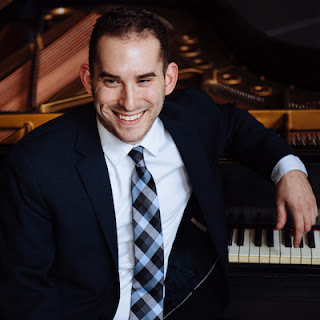Finalist solo recital series opens brilliantly with Mackenzie Melemed
American Pianists Association has adapted its presentation of finalists in its 2021 Classical Awards to our
 |
| Mackenzie Melemed opened the APA recital series. |
troubled times, with live-streaming of the solo recitals in addition to the opportunity to attend the performances in person.
The first of the series was Mackenzie Melemed's appearance Sunday afternoon at the Indiana History Center. The presentation clearly brought forward the finalist's musical personality while not greatly refracting a variety of music through a distorting individualized prism: The distinctiveness of Bach, Bartok, Schumann, and Laura Kaminsky (composer of the competition piece) was projected throughout with unflagging commitment and deep understanding.
Hearing it online, I was especially interested in what Kaminsky's "Alluvion" sounded like, in light of a recently received compact disc focusing on her piano music in the estimable interpretations of Ursula Oppens. I will post a review of "Fantasy: Oppens Plays Kaminsky" (Cedille Records) soon.
About "Alluvion," the composer favors a romantic treatment of the instrument without having to indulge in a wispy, retrospective neo-romanticism. Kaminsky revels in the flowing qualities of the piano techniques perfected by Chopin and Liszt, composers who created a language that worked against the anti-sustaining quality of piano sound, making indissoluble connections of melody and phrasing, building new forms of coherence as classical structures receded.
"Alluvion" opens with stentorian rumbling in the bass, soon takes into its purview a wide spectrum of registers and then brings everything into focus in the middle range. Figuration is florid, but the surefooted way new episodes find their expressive center remains constant. The work is colorful and comprises lighter textures as well; its expressive breadth feels no need to take in extended techniques or much pedal-enabled resonance.
Of the rest of the recital, there was stirring directness and clarity to Bach's Partita No. 1 in B-flat major, which opened the recital. Melemed displayed fine articulation of ornamental aspects and a sure sense of structure, with dynamics and tempo adjustments scrupulously detailed, yet stopping short of romantic intrusions. The balance of legato and staccato playing in the minuets was astute, and by the concluding gigue, it became clear that the super-speedy tempo would proceed with as much steadiness and directness as everything that had preceded the finale.
Bartok's Suite, op. 14, opened up new expressive possibilities for Melemed's artistry. The trenchant sonorities were crystal-clear, with occasional explosiveness. The rhythmic acuteness of the performance never stinted, and Melemed was able to avoid mere feverishness when it came to brightening the accented terrain. The "Sostenuto" finale, the composer's effective way of mitigating his characteristic spikiness while summing up the heft of the preceding movements, was movingly rendered.
A seasoned ability to handle accents within a texture came through as Schumann's Symphonic Etudes gathered torrential strength in its final pages. Among the work's difficulties near the end is having to rattle along at fortissimo while finding ways to make the accents even louder, yet not weighing down the momentum. Such demands seemed easily under control in Melemed's performance. Any terrors the work held for him had long since been laid to rest in his preparation.
It's notable that when Vladimir Horowitz spoke to Leonid Hambro of performing challenges that required sheer luck to come off as well in concert as they had in practice, a passage in Symphonic Etudes was what he cited. According to what Hambro recalled for Horowitz biographer Harold C. Schonberg, the titan of 20th-century piano said: "I practiced this passage, and I practiced, and when I would go to play I could never guarantee that I would play it right. When it came out right I was just lucky."
I have no idea if Melemed worried over the same passage or other places in this study-entangled set of variations, but Sunday's performance suggested that luck and preparation may have been working hand in hand to produce the indubitable success with which Melemed capped his recital.



are you the jay harvey who once worked for the Flint Journal?
ReplyDeletetony polk